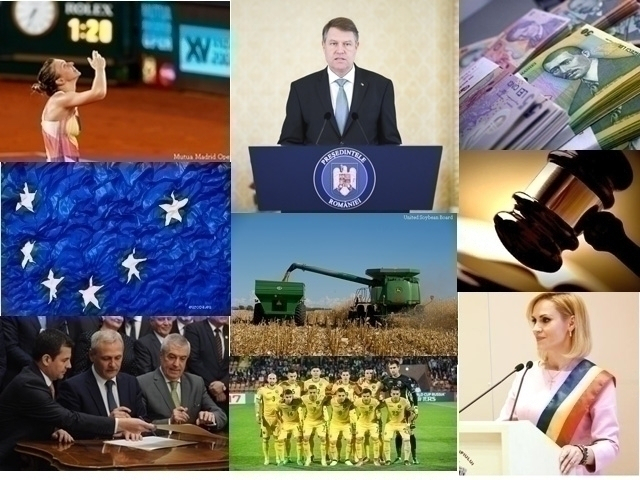The International Year in Review
A roundup of the year's international main stories

Florentin Căpitănescu, 30.12.2017, 11:20
Major issues on the EU agenda
The government in London launched in March, nine months after the referendum that divided the Kingdom, the procedure to leave the European Union. After months of tough negotiations, Brussels and London finally reached an agreement that wraps up one stage of the process. In December, the European Council noted that enough progress has been made on three main topics: the rights of European citizens after Brexit, the border between Northern Ireland and the Republic of Ireland, and the UK’s divorce bill.
Trade negotiations are to follow, which experts expect to be similarly hard. Migration is still an issue, even if the number of refugees flooding Europe has gone down. Greece and Italy are still under pressure, while several EU members in Central and Eastern Europe, in particular Hungary, continue to refuse compliance with the quota system proposed by the European Commission. Spain, though little affected by the refugee crisis, went through a serious political crisis towards the end of the year caused by a controversial referendum on Catalan independence.
On October 27, the Catalan parliament unilaterally proclaimed the independence of the region, which was not recognised by the EU. Madrid imposed direct rule on Catalonia, dissolved the regional parliament and called for new regional elections, while deposed president Carles Puigdemont fled to Belgium. In terms of foreign policy, the European Union entered a new stage of relations with the US, turning out to be much colder once Donald Trump was elected president.
It also kept its distance from Russia, especially as economic sanctions were kept in place over Russia’s involvement in the conflict in eastern Ukraine. However, great strides have been made as the trade agreement with Japan, the worlds third largest economy, was finalised.
In Europe, the rise of the far right continues
In 2017, the elections held in France, Germany, the Netherlands and Austria only confirmed the fact that the far right is gaining more and more ground. This year, far right parties repeatedly earned record-polling numbers, though never the majority. In France, the leader of the National Front Marine Le Pen reached the second round in the presidential elections in spring, with almost double the votes obtained 15 years ago by her father, Jean-Marie Le Pen.
The pro-European centrist candidate Emmanuel Macron won 66% of the ballot in the decisive round. Heading the En Marche! Movement, set up only a year before, he became the first president not to belong to either of the two political families, the Socialists and the Republicans, that have been in power since the Fifth Republic was established by Charles de Gaulle in 1958. In Germany, after federal elections, the Alternative for Germany, a Europhobic and anti-immigration party, gained seats in the Bundestag for the first time, with over 12% of the vote.
In the Netherlands, Geert Wirlders right wing Freedom Party became in March the second biggest political party in parliament after the Liberals. The Austrian version of the Freedom Party, the oldest among European nationalists, won 26% of the ballot in the October elections. The result guaranteed its presence in the government led by Conservative Sebastian Kurz. At 31, he is Europe’s youngest prime minister. The moderate popularity of Europhobic and anti-immigration parties accelerates the reshuffling of the political checkerboard in Europe.
The first year of Donald Trump’s term in office
On January 20, 2017, the Republican billionaire Donald Trump became the President of the United States with the slogan “America first”, but suspicions of Russian interference overshadowed the beginning of his mandate. His unique manner of shaping up the country’s foreign policy shattered the balance struck by his Democrat predecessor, Barack Obama, the US leaving or threatening to leave several international agreements.
Among them, the Trans-Pacific Partnership, signed with 11 countries in the Asia-Pacific area, Japan included, the Paris Climate Agreement and UNESCO. However, recognising Jerusalem as the capital of the state of Israel was perhaps the most controversial decision made by Trump.
The measure was almost unanimously criticised by his country’s western partners and triggered a wave of protests in the Middle East. Also in 2017, President Trump had a very aggressive discourse towards what he called “the brutal regime in North Korea” against the backdrop of North Korea’s ballistic missile tests.
Attacks in the West
Hundreds of people lost their lives in the 2017 attacks in the West, mainly in the US and Great Britain, despite the international community’s efforts to fight terrorism. In May, in the city of Manchester, the UK, during a concert by singer Ariana Grande, suicide bomber Salman Ramadan Abedi, a Briton of Libyan ancestry detonated a makeshift bomb killing 22 people and injuring 60. In August, terrorists hit Europe once again, this time Barcelona. 14 people were killed and 100 wounded by a van that ploughed into a crowd in the Las Ramblas area of Barcelona.
The bloodiest attack, however, took place in October in Las Vegas, in the US. 59 people died and more than 150 were injured after a 60-year old man opened fire on the crowd attending a concert. The carnage fuelled debates on the access of American citizens to firearms.
End of career for famous athletes
The most famous sprinter of all times, a super star of athletics and a man with a special charisma, the Jamaican Usain Bolt bid farewell to professional sports in August, after the World Championships. He has an extraordinary medal record, which includes 8 Olympic titles and two world records that seem impossible to break. Also, football lovers bid farewell to several legendary players among whom Italy’s Francesco Totti, Germany’s Philipp Lahm, Spain’s Xabi Alonso and Brazil’s Kaka.




























